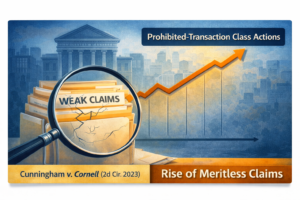
Cunningham v. Cornell and the Rise of Meritless Prohibited Transaction Suits
See updated memo at https://ebeclaw.com/cunningham-v-cornell-university-shifting-the-burden-in-prohibited-transaction-claims-consequences-for-erisa-401k-class-action-suits-and-latest-developments/
By Charles C. Shulman, Esq.

In Cunningham v. Cornell University, 604 U.S. 693 (April 17, 2025), the Supreme Court, reversing the Second Circuit, unanimously ruled that plaintiffs alleging prohibited transactions under ERISA §406 need not plead that statutory exemptions under §408 are inapplicable. The Court held that exemptions are affirmative defenses defendants must prove. Plaintiffs need only allege that a plan fiduciary caused the plan to engage in a transaction with a party in interest – such as furnishing goods or services. The burden of proving an applicable exemption rests solely with the defendants.
By lowering the pleading threshold, the ruling makes it easier for fiduciary lawsuits to survive motions to dismiss, shifting the burden to defendants and advancing cases to costly discovery. This could encourage “meritless, lawyer-driven lawsuits” and “strike suits,” since virtually any payment to plan service providers (e.g., recordkeepers) could now survive dismissal. Plan sponsors may settle meritless claims to avoid expensive discovery or trial, ultimately increasing plan costs and harming participants. The increased litigation risk could discourage plan innovation and burden fiduciaries performing necessary, prudent services. Given the lowered pleading standard, legal experts emphasize the importance of robust fiduciary governance and documentation, including maintaining thorough records of fiduciary decisions, regularly benchmarking service providers and fees, and documenting regular fiduciary committee meetings.
